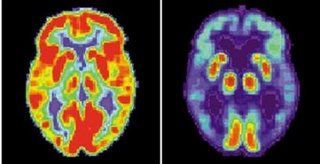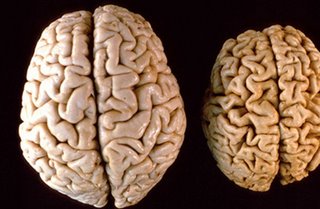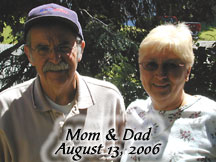 source
sourceA split-view image showing PET scans of a normal brain (L) and a brain with Alzheimer's disease (R).

How many times do I have to say how awful this disease is?
My father will never get better. He will never be my daddy again. He will be a shrunken confused frightened man (who calls my mom "hey" and thinks my husband is just some guy who comes and mooches food and who knows what he thinks of me) who will get more confused and more frightened until every day is the best he can be, and yesterday was always better.


3 comments:
Dear Bert,
You write so well and true. Your description of your day spent with the police and the neighbors actually made my shoulders tighten.
Your latest post about suicide as an alternative to AD, while unacceptable to me as an option, rings of truth and pain. The common notion that this is just a memory loss disease is so incorrect. Without one's ability to connect to past experiences, who are we really? Who am I if my life has no context? A refugee? From what?
None of us, ever, want to face this disease after we've seen and lived through the havoc it causes. It's what I mean when I say the more you love the person who has it, the harder it will be. There is no neat, clean, solution. It is messy and ugly and completely, totally unpredictable except the fact it will always get worse. And it lasts a longggg time. Eleven years for us, of never knowing what tomorrow would bring. I am amazed by the distance we traveled as I get further and further from where my father and I started.
Please, Bert, write the words that will ease your mind, we'll listen, but don't give up. Don't think it will never end, because it will. I never wanted to look back and regret my choices, so instead I did all that I could think to do. It didn't help my father in the sense of alleviating his disease, but when I accepted the fact things were not going to get better, I had to make the most of what I did have or, in my mind, the disease would win. Life became a dance of tiny gestures. He could hold my hand, sometimes. He could feel the sun on his face, the breeze on his cheek. He could enjoy rides in the car - we drove thousands of miles around our town and city - with no destination in mind, just looking at the day.
My life changed in every way. The simplest things were the greatest accomplishements - showering him without chasing him around the room to rinse his hair, seeing him drift off to sleep after a bad dream, playing "smooth the wrinkles out of the blanket" for hours. I drew his portrait often, he would hold still for that for some reason. I stopped asking him if he could remember this or that, I didn't care to try and make him remember, he just couldn't. And it frustrated him. Everything that was known became unknown, everything that had been one thing could quite literally become another in his mind. Friend becomes foe, night becomes day, children become strangers. This was his world - where nothing held the same significance for him as it did for me.
In the beginning, it wsa hard to believe it's happening because there is such a shift of responsibilities, at least that's the way it was with me. I became responsible for a man who would have died before allowing ANYone to take that role in his life. But he didn't die, he lived for eleven years that way. It became my challenge to bend to the disease, sometimes it required so much more than I thought I had. But over time, I learned from it - he needed quiet but not lonliness, a routine but not regementation, no confrontation, no yelling, simple explanations and lots and lots and lots of agreement. Is that a book? Yes. Did we live in that house? Yes. Do you want to go to bed or take a nap? Neither? Don't want to go to bed? Yes, just take a nap then. On and on and on. Whatever his question, I found a way to say yes and when I could agree with him, he was much more compliant. We knew my father better than anyone and we provided a life for him that brought safety, peace and even on the very best of days, some joy. None of it was easy, but all of it was doable. I loved my father dearly but I will never go through this again, with anyone, for any reason.
If he could have understood the choice he was making, I wonder if he would have chosen death. I wondered that A LOT. But he was alive, there was a part of him, on a very deep level, that was ALL him. He would smile when you would least expect it. Gently pat my hand when I was doing something else. Even to my mom, when he hadn't spoken for weeks, clearly say, "I love you." out of the blue. The little things, the smallest sense of him still being a man we all loved, kept us going for a long, long time.
It made us fight for him. To honor the little shred of life that attached us to him, and him to the world. When he finally died, I felt we had delivered him as far as we could and god, or whatever the force is at work, showing mercy, took him the rest of the way.
This is a long post, much more than I meant to say but there is something in your posts that I can SO identify with, perhaps you speak a language I recognize as my own.
Keep writing. Don't ever give up.
hi. my name is Katy. My grandmother (who i call "nana") has alzheimer's. Just in the last year and a half it has gotten so much worse. I couldn't help but feel like you when u said your dad called his wife "hey". To my nana, i am "You! Little girl." It hurts so bad to see her like this because she was the one person i was really close to. I love her so much and (even though i know it probably won't happen) hopes she gets better. My thoughts are with you.
Try tumeric
Post a Comment